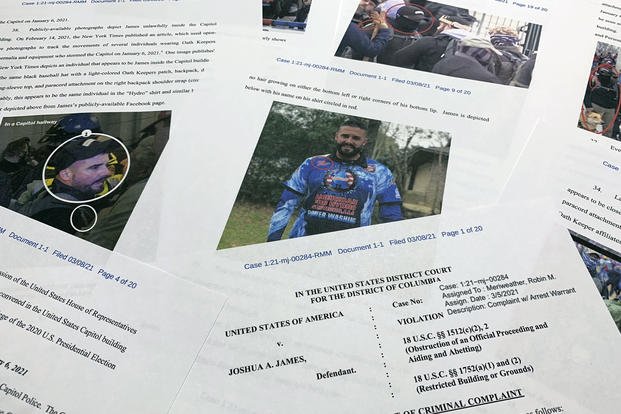A Former Army Veteran’s Lenient Sentencing in Capitol Riot Case Sparks Discussion
A federal court decision has turned heads as a U.S. Army veteran, convicted for his role in the January 6th Capitol riot, received probation instead of jail time. This decision has added another layer to the ongoing discourse about justice following the 2020 election-related unrest.
Joshua James, a 37-year-old from Arab, Alabama, was notably the first defendant in the Capitol riot cases to admit to seditious conspiracy, a severe charge linked to the violent events of January 6, 2021. Despite his significant involvement, James was sentenced to three years of probation, inclusive of time in a residential re-entry center and home detention, sparing him from prison.
His cooperation with the Justice Department was crucial, offering insights into the far-right Oath Keepers organization, though he did not testify against its leader, Stewart Rhodes. James was the last of the Oath Keepers defendants to be sentenced, and his cooperation was deemed pivotal by his defense team.
U.S. District Judge Amit Mehta, who presided over the case, cited James’s military background and his efforts to make amends as reasons for the lenient sentence. “Because if he can do that, I think the rest of us can, too,” Mehta remarked, emphasizing the importance of rehabilitation over incarceration.
James, who expressed regret for endangering police officers during the riot, stated, “That’s not who I am. I help people in danger.” His military service and the hardships he faced post-service were highlighted by both the court and his attorneys, who noted the loss of his military benefits following his conviction.
The prosecutors acknowledged James’s significant role in the conspiracy, yet credited him for his cooperation which provided a deeper understanding of Rhodes’ influence and plans around January 6. Despite recommendations for a two-year prison term, the judge opted for probation, reflecting on the broader efforts of the judiciary to balance justice fairly.
James’s military career ended abruptly after being injured in Iraq, which left him with a profound sense of loss and unfulfilled purpose. As a welder, he now faces financial challenges due to the loss of his military benefits, previously a substantial part of his income.
In the wake of former President Donald Trump’s promises to pardon Capitol rioters, Judge Mehta’s remarks during another sentencing highlighted the judiciary’s commitment to impartiality, stating, “We haven’t been doing politics here. Not at all.”
While James’s actions on January 6 were critical, including his direct involvement in leading Oath Keepers into the Capitol, his post-riot interactions with Rhodes, who advised him to change his appearance, were pivotal in understanding the group’s dynamics.
This case continues to underscore the complexities involved in addressing the January 6 events, as authorities strive to cement the incident’s lessons in the national consciousness, balancing punishment with opportunities for redemption.
© Copyright 2024 Associated Press. All rights reserved. This material may not be published, broadcast, rewritten or redistributed.










